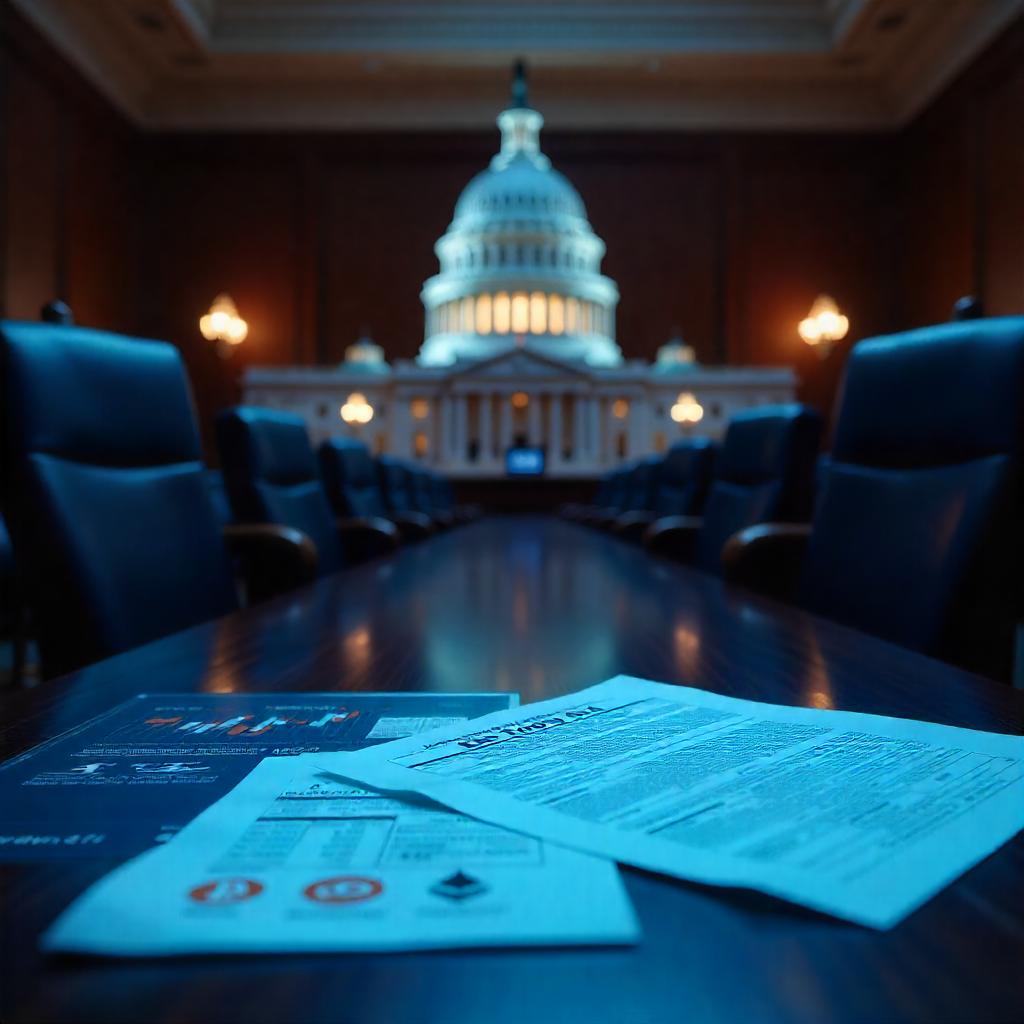The crypto tax hearing delay has landed unexpectedly. The U.S. House Ways and Means Subcommittee postponed its scheduled July 16 session during a surprise recess, leaving accountants and businesses in limbo. This crypto tax hearing delay matters now because it stalls clarity on digital asset taxation—and uncertainty hits every compliance plan hard.
You might wonder what a “modern tax framework” even means here. It refers to updated rules for capital gains, staking income, wash-sale treatment, and de minimis exemptions. With the crypto tax hearing delay still fresh, firms can’t fully update systems or guide clients on reporting requirements.
This article cuts through confusion. We’ll explain the hearing’s purpose, why it was delayed, and how this crypto tax hearing delay affects your tax planning. You’ll get a clear understanding of what’s stalled—and what moves you can make today.
Background: Hearing Purpose and Scope
The crypto tax hearing was set by the House Ways and Means Subcommittee. It planned for July 16, 2025. It intended to explore a modern tax framework for digital assets. This hearing aimed to clarify:
Capital gains treatment for crypto trades
Tax rules around staking income
Wash‑sale and de minimis thresholds
This would help accountants and businesses create clear systems for tax reporting.
Eleanor Terrett, a crypto journalist, confirmed the hearing’s focus on digital asset taxation.
A modern crypto tax framework would bring:
Legal clarity for staking and mining
Structured guidance on wash‑sale rules
Thresholds allowing small trades to avoid tax burdens
For crypto tax accountants, this is crucial. Without updated rules, reporting remains unclear. Systems cannot adapt reliably. The crypto tax hearing delay now leaves professionals awaiting guidance.
Why the Hearing Was Postponed
The crypto tax hearing delay stemmed directly from an unexpected House recess. Members left early to address spending bills, creating a sudden pause in scheduled hearings. This “surprise recess” knocked out key sessions, including the Ways and Means crypto hearing.
This shift means the crypto tax hearing delay now lingers without a new date. The subcommittee has yet to reschedule. Reports confirm that lawmakers did not set a replacement date, leaving that decision open.
The procedural impact has been significant. With no hearing, progress on staking rules, wash‑sales, de minimis thresholds, and capital gains treatment stops cold. The crypto tax hearing delay affects every stakeholder. Accountants cannot finalize guidance systems. Businesses cannot strategize client communications. Enforcement remains paused.
Industry watchers say the delay complicates tax processing for the 2025 filing season. Without updates, the IRS may lack authority to clarify definitions. Tax professionals risk misclassification without current standards.
The subcommittee plans to reconnect once lawmakers return. Until then, the crypto tax hearing delay haunts the digital asset tax landscape. No one knows when housing policy or energy bills won’t knock this hearing off the calendar again. The uncertainty highlights how fragile progress remains.
Implications of the Delay
The crypto tax hearing delay introduces real complications for accountants and businesses. It stalls the push toward a modern tax framework, leaving pivotal items in limbo.
Regulatory Timeline Slows
Without a rescheduled hearing, progress on crypto tax clarity grinds to a halt. Decisions on capital gains, staking income, and wash‑sale rules remain unclear. This delay pushes potential rule changes into late 2025—or even 2026.
Compliance Uncertainty
Accountants struggle to standardize client reporting. Tax guidance that firms and exchanges need won’t arrive soon. As a result, tax professionals may default to existing IRS rules, which complicate planning and compliance.
Market Sentiment Impact
Crypto legislation is tied up in broader “Crypto Week” delays. Procedural blocks in the House signal legislative gridlock. This uncertainty weighs on investor confidence and stifles institutional planning.
IRS Enforcement Risks
Meanwhile, the IRS continues preparing for stronger enforcement and improved cost-basis reporting via Form 1099‑DA. With no legislative clarity, audits and penalties can escalate.
Opportunity for Stakeholder Input
A silver lining exists. The extra time offers a chance for better stakeholder engagement. Industry voices can influence framework details before any final policy drafts.
Ongoing Crypto Legislation: Wider Picture
The crypto tax hearing delay sits at the center of a broader legislative moment. Lawmakers held what they called “Crypto Week” from July 14 to 18. They aimed to pass three major bills: the GENIUS Act, the CLARITY Act, and the Anti‑CBDC Surveillance State Act.
GENIUS Act: Stablecoin Clarity
The Senate-approved GENIUS Act would create the first federal regulatory framework for stablecoins. It mandates 1:1 reserves, regular audits, AML/KYC compliance, and dual federal-state oversight. The House moved swiftly to adopt it over its own STABLE Act. This shift clears a faster path to the president’s desk if the bill passes Congress intact.
CLARITY Act: Market Structure Rules
The CLARITY Act would define whether digital assets fall under SEC or CFTC jurisdiction. It sets disclosure, custodial, and segregation rules for exchanges. The bill passed committee votes in both the Financial Services and Agriculture committees, and awaits full House and Senate approval.
Anti‑CBDC Act: Privacy Safeguards
The Anti‑CBDC Surveillance State Act would block the Federal Reserve from issuing a retail central bank digital currency. It frames CBDC as a threat to financial privacy and individual freedom, a stance echoing conservative concerns over surveillance finance.
Legislative Process Hits Snags
Negotiations stalled when a procedural vote failed due to internal GOP opposition. Some conservative Republicans joined Democrats to block debate on the bills, citing disagreements over packaging and priorities. The impasse slowed progress across all three measures. President Trump personally intervened to negotiate deals and realign support.
Market Reactions and Momentum
Momentum returned when Trump confirmed his efforts paid off. Crypto markets surged: Bitcoin hit new highs near $120K, Ethereum and crypto stocks rallied on optimism around the GENIUS Act and broader legislative clarity.
These developments add context to the crypto tax hearing delay. Without tax rule clarity and amid legislative turbulence, stakeholders face a fog of uncertainty. Even if legislation passes, key tax provisions remain stalled without the intended hearing.
Expert Take: What Tax Pros Should Do Now
The crypto tax hearing delay doesn’t mean tax professionals can afford to wait. If you’re advising clients or running compliance systems, this pause is your window to act—not to stall.
Stay Proactive, Not Passive
Assume delays will continue. Don’t bet on quick rescheduling. Continue guiding clients under current IRS interpretations while monitoring updates closely.
Document Client Activity Aggressively
Given IRS intent to ramp up enforcement, start collecting precise transaction data now. Encourage clients to track staking, swaps, NFTs, and airdrops. Misclassification risks are high without new guidance.
Prepare for 1099‑DA Phased Rollout
The IRS will begin enforcing Form 1099‑DA by 2025 for gross proceeds. By 2026, cost-basis tracking kicks in. Systems should be ready now to handle these obligations.
Advise on Reasonable Positions
Where tax law remains unclear—like staking income or de minimis exemptions—advise clients on adopting “reasonable positions” based on available case law and IRS notices. This can reduce audit risks under Section 6662.
Engage With Policymakers
This delay gives firms time to submit comments or testimony. Proactive engagement can influence final frameworks. Use trade associations and professional bodies to raise industry needs.
Stakeholder Perspectives
The crypto tax hearing delay drew diverse reactions across the crypto ecosystem. Each group views the pause through its own lens, shaped by risks and missed opportunities.
Tax Professionals
Accountants voiced frustration. Many had prepared to brief clients post‑hearing. Now they face another quarter of uncertainty, and no clear timeline for updates. Compliance firms are hesitant to roll out staking or wash-sale tracking modules without clarity.
Exchanges and Platforms
Digital asset platforms see the delay as a blow to regulatory certainty. Without rules on cost-basis tracking or de minimis thresholds, 1099 rollout plans may misalign with future expectations. Some exchanges quietly paused upgrades until Congress resumes action.
Lawmakers
Committee members expressed disappointment but pledged to reconvene. Aides from the Ways and Means office confirmed they expect to reset the calendar once the House returns.
Industry Advocates
Lobbyists from Coin Center and the Blockchain Association emphasized the need for urgent reform. They argue that without legislation, the IRS will continue using outdated interpretations that don’t reflect modern use cases like DeFi or staking.
Public Traders and Investors
Retail traders largely welcomed the delay. Some feared aggressive changes. Others simply want more time to prepare for compliance. But investor confidence in long-term tax clarity remains low.
Overall, this pause intensifies pressure across all corners of the crypto world. Without new hearing dates, everyone remains in limbo.
Next Key Dates & Watchlist
The crypto tax hearing delay shifts all timelines. Here’s what to watch next and why it matters for tax pros and businesses.
House Recess and Rescheduling Timeline
The House officially recessed the week of July 7, postponing the Ways and Means crypto hearing. No new date is scheduled yet.
Rescheduled Hearing Status
Despite the halt, the House official calendar still lists the oversight hearing for July 16 under “Making America the Crypto Capital.” However, the hearing did not take place.
Watch for Calendar Updates
Once the House returns in late July, the subcommittee will likely announce a reschedule date. Keep close tabs on the Ways and Means calendar and lawmakers’ statements.
Senate Timeline & IRS Moves
Meanwhile, the Senate may push forward crypto tax provisions independently. And the IRS plans phased implementation of Form 1099‑DA: gross proceeds by 2025 and cost-basis tracking by 2026.
What to Do Now
Track three critical timeframes:
Mid‑to‑late July: House returns and potential rescheduling
Fall 2025: IRS enforcement of 1099‑DA rules
Ongoing: Senate hearings and comment windows
Missing one date could derail compliance prep. Bookmark committee calendars this week.
Final Thoughts
The crypto tax hearing delay is more than a scheduling mishap. It’s a reflection of how fragile digital asset regulation remains. Without a modern framework, accountants, investors, and platforms are left to interpret outdated IRS guidance in a space that evolves faster than Washington can track.
While the delay halts legislative progress, it also creates a critical opportunity. Tax pros and industry players must prepare now, engage with policymakers, and stay informed. Clarity may be delayed—but readiness shouldn’t be.
The next few months will define whether the U.S. moves toward crypto tax leadership—or lags behind as markets seek clearer jurisdictions. Until then, the uncertainty continues.





